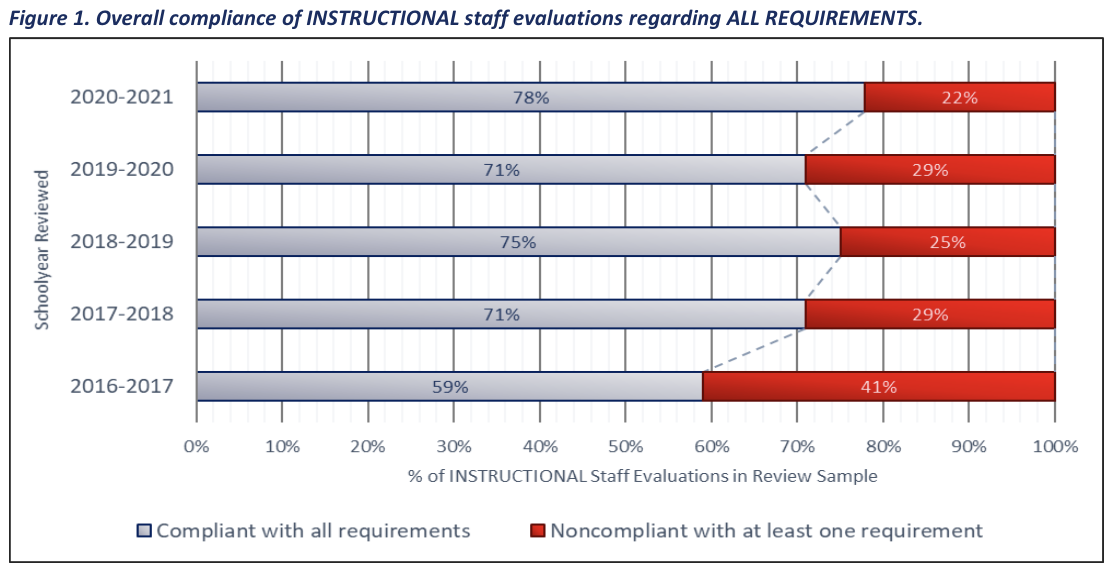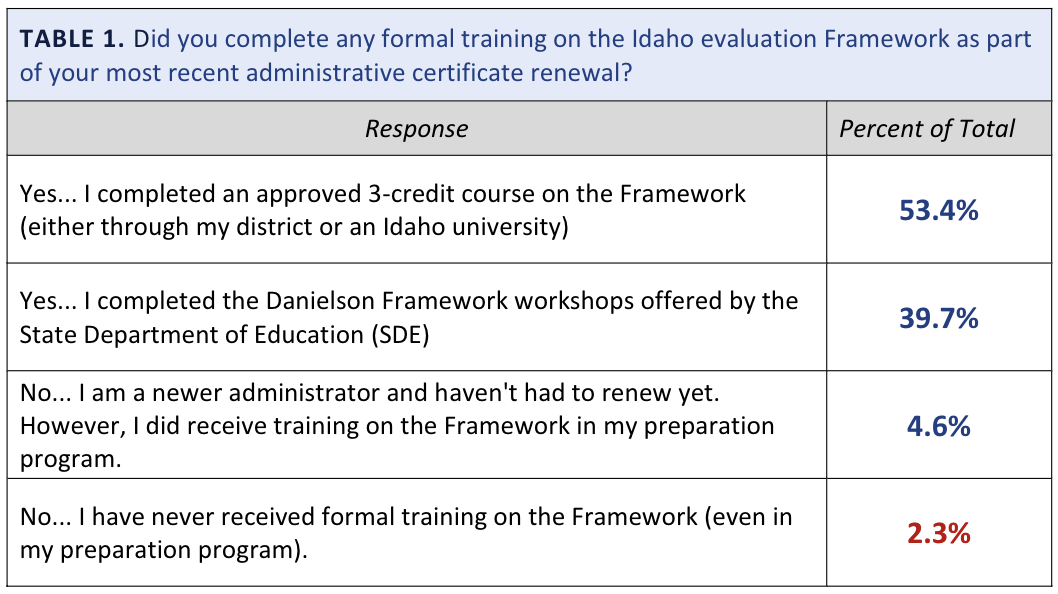More than 20% of Idaho’s K-12 administrators don’t meet all state requirements for evaluating their teachers, according to findings from the State Board of Education’s 2020-21 Educator Evaluation Review.
Still, state reviewers found “promise” in the report’s new batch of data. Overall rates of compliance “are as high as they have ever been and appear to be trending upwards,” the report’s evaluation team concluded in the review, which also includes information on evaluations for “pupil service staff,” such as school counselors.
Educator evaluations have been a closely watched metric in Idaho for years. In 2017, the Idaho Professional Standards Commission reprimanded two former K-12 superintendents — one of which included then-K-12 superintendent Rep. Ryan Kerby, R-New Plymouth — for violating state law and ethics rules by submitting inaccurate teacher evaluation data to the state. Year after year, K-12 administrators also report that nearly all of their teachers are “proficient” or “distinguished,” despite mixed student performance. Almost 99% of Idaho’s public school teachers received one of the two top marks on their performance evaluations last year.
The latest educator evaluation review doesn’t gauge teacher performance, but rather measures how well administrators, including principals, comply with requirements overseeing the process.
Here’s a closer look at the latest report’s findings.
Overall compliance for teacher evaluations in 2020-21: 78%
Idaho requires administrators to meet four primary requirements when evaluating certified staff:
- Complete at least two documented observations of staff members’ professional practice, the first of which must be completed before Jan. 1.
- Complete at least one additional measure of “professional practice,” which may be based on “student feedback, parent feedback or a portfolio.”
- Complete at least one measure of student achievement or indicator of “student success.”
- Complete at least one evaluation before June 1, which must be aligned to professional standards and based on a combination of the items above.
Compliance for all four requirements overseeing evaluations climbed from 71% to 78% from 2019-20 to 2020-21, according to the report, which drew on a randomized sample of 181 Idaho administrators for a snapshot of outcomes in districts and charter schools across Idaho. In all, reviewers examined 408 staff evaluations from 165 administrators at 60 Idaho school districts and charter schools.
Here’s how the overall rate for compliance in terms of teacher, or “instructional staff,” evaluations has changed since 2016-17:

The report also includes compliance outcomes for specific requirements within the broader evaluations framework. For example, reviewers, who ranged from K-12 administrators to a retired Boise State University professor, calculated a 93% compliance rate for the first requirement, completing at least two documented observations starting Jan. 1. That rate is up from 72% in 2019-20.
The 2020-21 compliance rate for the second requirement tied to feedback from a student, parent or portfolio: 91%.
Compliance is lower among evaluations for other certified staffers
Compliance was lower among certified staffers who aren’t teachers, the report showed.
Just 65% of reviews for pupil service staff, which includes counselors, met all requirements. This number is also up from prior years, reviewers noted, by two percentage points from 2019-20 and by 33 percentage points from 2017-18.
Reviewers calculated a 79% compliance rate for the first requirement overseeing reviews for pupil service staff, which is up from 68% in 2019-20.
The compliance rate tied to the second evaluation requirement for these employees was higher, at 90%, a 12 percentage-point increase from 2019-20.
Some administrators may have no training for conducting evaluations
The review also outlines findings from surveys administered to administrators and staff.
One question centered on required training on the statewide framework for evaluating staff every five years. Over 2% of respondents said they never received any training:

Reviewers addressed this finding in the report. It could signify that some evaluators are “unqualified,” but the small number of responses could also be the result of “accidental selection on the survey instrument.”
State Board staff will “follow up on these responses using the contact information provided by the evaluators in question,” the reviewers wrote.
Other survey data focused on the value of evaluations in general. On a scale from 1 to 6, administrators tallied an average rating of 4.77 in response to how accurately their evaluations measured staffs’ impacts on student achievement.
Staff who were asked the same question tallied an average rating of 4.72.
Reviewers offered suggestions for improvement
Reviewers lauded the upward trend in review compliance outlined in the report, and noted that, in general, “the exceptions to these findings seem related to sincere misunderstandings of specific framework requirements and isolated instances of bad-faith performance.”
“It does not appear that any widespread, pervasive issues with willful noncompliance currently exist,” they added.
Still, the reviewers offered five recommendations to the State Board for improving the evaluations process:
- A better definition for “acceptable measures of professional practice” regarding “parent/guardian input, student input and portfolios” outlined in the first requirement for staff evaluations.
- A selection of quality review evaluations as examples for administrators.
- Create and share a “guidance document that details requirements in the statewide evaluations framework.”
- Restructuring the random sample of administrators to ensure that representative samples are being taken from districts and charters that could be financially impacted by review results.
- Research and invest in software that can “better facilitate file collection” and a “collaborative” review process.
